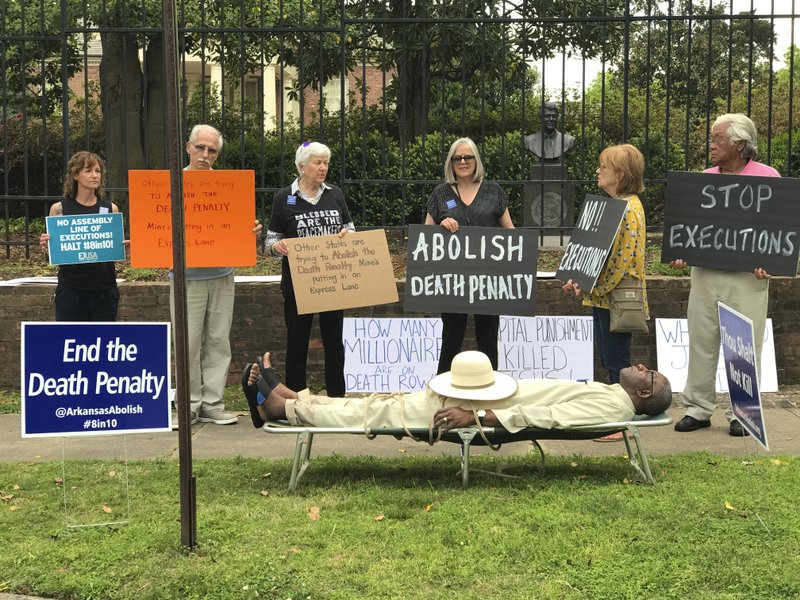Ethics charges brought by judicial regulators against Pulaski County Circuit Judge Wendell Griffen are a politically motivated attack on his religious freedoms that should not be allowed to stand, the judge's lawyers stated Monday.
Friday, Judicial Discipline and Disability Commission special counsel formally accused the 65-year-old jurist of nine violations of the Arkansas Judicial Canon, all stemming from his attendance at an April 2017 prayer vigil and an anti-death penalty protest last year, on the same day he was called on to decide an issue related to execution drugs.
The charges are part of a broader effort to drive Griffen from the bench and bankrupt him, his lawyers claimed in a news release that is the judge's first public response to the accusations.
The disciplinary commission will conduct an as-yet unscheduled hearing to decide the merit of the accusations against Griffen, which could result in his removal from the bench.
"The [commission] has apparently chosen to become complicit in a state-orchestrated and financed political conspiracy against Judge Griffen aimed at forcing him to expend personal funds to defend himself," attorneys Mike Laux of Chicago, Michael Matthews of Florida and Austin Porter of Little Rock said in a two-page statement.
"He will not be intimidated. He will not forsake his faith in God and justice. Nor will he be forced from the office he holds by virtue of the trust conferred by the voters, no matter who else may be displeased by his beliefs and judicial independence."
In filings with the commission on Monday, Griffen demanded that its members dismiss the complaint, stating that he is being punished for exercising his rights.
"[The complaint] demonstrates an irrational and unprecedented hostility toward Judge Griffen and to controlling legal authorities about freedom of speech, freedom of peaceful assembly, freedom of religion and freedom of religious expression enshrined in the First Amendment and protected by the Arkansas Religious Freedom Restoration Act," the filing states
Griffen is also questioning why regulators have taken more than a year to act on a complaint that was lodged against him in April 2017. During that time, regulators have failed to respond to his original motion to dismiss filed in May 2017 and have neither turned over investigatory materials he requested then nor explained why they have not done so, Monday's filing states.
The judge is asking the commission to force lead investigator Rachel Michel to quickly answer his demand for a dismissal and also require her to respond to his request for the materials. He also wants a public hearing on his dismissal arguments.
According to the ethics charges, regulators say they did take Griffen's rights into consideration.
"While the [commission] has no basis on which to evaluate Judge Griffen's motives or to question any good-faith belief, the record fails to support any primary religious motive of anti-death penalty vigil, but the record does establish that Judge Griffen was dressed in what appears to be a traditional inmate jumpsuit or a reasonable facsimile thereof, and he was wearing a button or sign that compelled the State of Arkansas to 'end the death penalty,'" the charging documents state.
"Judge Griffen holds a right to free speech, but once Judge Griffen asserted his free speech in unequivocal opposition to the death penalty, he had an obligation to disqualify himself in every case affecting the penalty," the documents say.
The charge states that Griffen should have recused from the lawsuit, a dispute over the ownership of some of the state's execution drugs that was filed the same day he was attending anti-death penalty demonstrations, especially given his well-known antipathy to execution as chronicled in his public writings and speeches.
Griffen temporarily barred prison officials from using the chemicals in question, an order that could have forced the delay of at least two scheduled executions except that it was countermanded by the Arkansas Supreme Court at the request of Attorney General Leslie Rutledge.
The suit had been brought by a drug manufacturer that accused prison officials of duping it into selling the state some execution chemicals, then refusing to honor a promise to return the chemicals.
The high court also stripped Griffen of his authority to hear any litigation, civil or criminal, involving capital punishment, and instigated the complaint to the judicial discipline commission.
The judge who replaced Griffen in hearing the lawsuit also barred the state from using the chemicals, an order that the state high court also overturned before any executions could be delayed.
Griffen has filed his own ethics complaint against the Supreme Court with the judicial commission and is also suing the seven justices in federal court.
Metro on 06/12/2018

